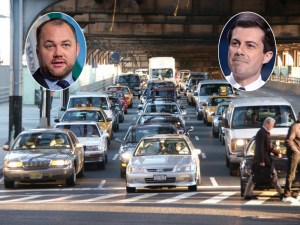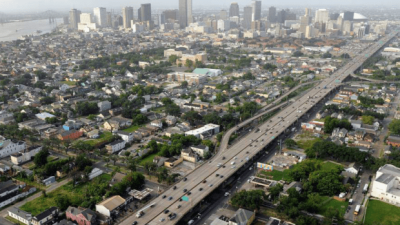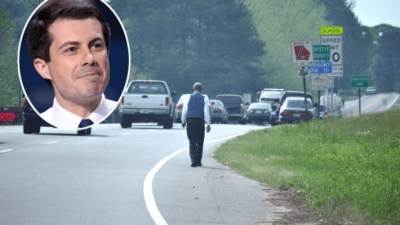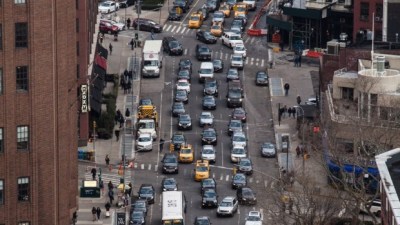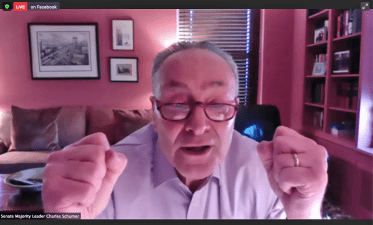What Will ‘Mayor Pete’ Mean for the U.S. DOT?
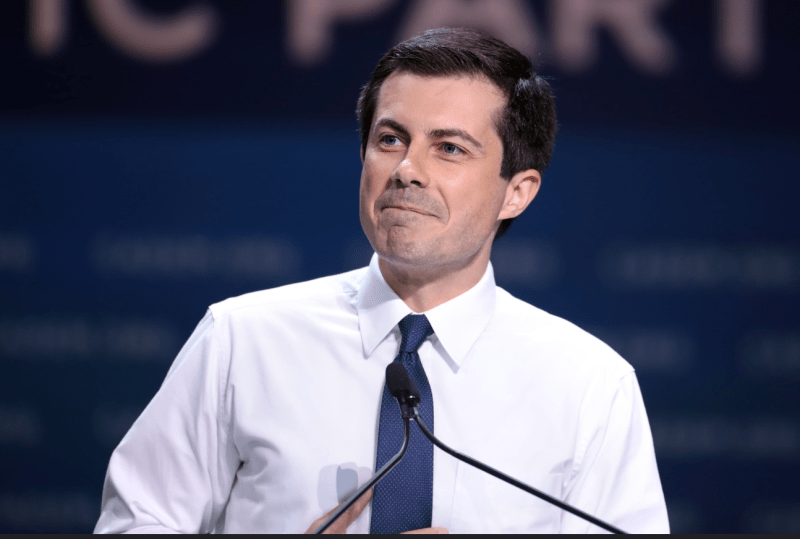
President-Elect Joe Biden’s pick of South Bend Mayor Pete Buttigieg to be the next Transportation secretary drew polarized reactions from sustainable transportation advocates who were either thrilled with his big ambitions for transit and ending traffic violence, or wary of his inexperience in implementing either.
Buttigieg was a surprising choice for the post, which experts speculated would go to a transit or transportation veteran like New York City Department of Transportation Commissioner Polly Trottenberg or a major city mayor who had dealt with large-scale federal transportation grants, such as Los Angeles’s Eric Garcetti. But others were thrilled to see a Midwestern former mayor take the helm of an agency that has not always recognized the unique challenges of ending car dependency in transit-poor cities where most Americans live — and argued that his vision for transportation reform was far bigger than South Bend’s modest 18-route bus network.
Regional Impact: If @PeteButtigieg heads @USDOT, he and @RepMarciaFudge @USHUD would mean leaders from slow growing, older industrial metros would set transportation and housing policy — that perspective has been sorely missing from federal decision-making for a long long time
— Bruce Katz (@bruce_katz) December 14, 2020
During his days as a presidential hopeful, the 38-year-old drew applause for his progressive transportation plan, which was significantly more aggressive on unravelling car culture than the president to whom he’ll soon report.
Candidate Buttigieg proposed a $150-billion budget for the Federal Transit Administration — 13 times more than it spends now. Biden, by contrast, promised to “provide every American city with 100,000 or more residents with high-quality, zero-emissions public transportation options through flexible federal investments,” but declined to make such a specific funding commitment. And Mayor Pete was the only candidate to propose a shift to a vehicle-miles-travelled tax over a gas tax, which many experts agree could drastically disincentivize driving if properly priced.
Am surprised at yr dismissive take. Buttegieg is young, smart, urbanist, inquisitive. Maybe he'll ask basic but taboo Q's re highway/transit funding splits & "Level of Service" b.s. & rising pedestrian-cyclist death count due to giant SUV's & texting. Am cautiously optimistic. https://t.co/nWZ3VpKL31
— Charles Komanoff (@Komanoff) December 15, 2020
More important, Buttigieg was the only Democratic hopeful to propose a national commitment to end the epidemic of traffic violence that claims about 40,000 lives on U.S. streets every year. The simple recognition that car crashes are preventable with good infrastructure investments and thoughtful policy could be a game changer for the discretionary grants over which the secretary largely maintains control; that Buttgieg pledged to require states to “actively improve their safety records or road design processes, or else lose federal funding for other roadway projects” is virtually unprecedented for a secretary.
“[Buttigieg] recognizes that safety needs to be the first priority of our transportation system,” said Leah Shahum, director of the Vision Zero Network. “And given his experience, he is likely to understand that local communities need more voice in transportation decisions, which has not been well-understood enough at the Federal level. We expect that Buttigieg understands how the intertwined crises of climate change, economic pain and systemic racism facing our nation can be improved upon with smart transportation choices and real leadership that isn’t afraid to challenge the status quo.”
Shahum isn’t the only transportation leader who views Buttigieg’s small-city resume as an asset rather than a liability. Supporters pointed out that Mayor Pete made the most of the limited powers of his office to reform the Hoosier city’s transportation network, eliminating or reducing mandatory parking minimums citywide and creating the city’s Smarter Streets initiative, which created targeted pedestrian and cycling improvements throughout the city (though some say he didn’t do enough, and he didn’t always get there in time.)
Being a mayor is the toughest job in politics. Unlike members of Congress (who many of you want to see in top Cabinet positions), we balance multimillion dollar budgets, manage thousands of employees, and regularly interact with the people we represent. (2/5)
— Alex Morse (@AlexBMorse) December 14, 2020
But the future secretary’s street safety record isn’t completely spotless. Buttigieg drew outrage from Black Lives Matter activists in his home city for his failure to fire the city police chief following repeated instances of racist misconduct and brutality in the department, which would later draw comparisons to Chicago Mayor Rahm Emanuel’s cover-up of the murder of Laquan McDonald by a city police officer. Buttigieg argued that he didn’t have authority as mayor to fire the specific officers accused of the worst behavior — an attitude which led advocates to accuse him of passing the buck. (Streetsblog Chicago pointed out that Mayor Pete has one thing going for him: He’s not Emanuel!)
Buttigieg’s larger platform and persona as a candidate also drew skepticism that he could represent the interests of Black constituents, on city streets and beyond. Progressive organizer Benjamin Dixon wrote a fiery piece in the Guardianopposing the Indiana native’s fitness for federal office, insisting that “it’s not the fact that he’s white. It’s the fact that, to many of us, he is the embodiment of white privilege — someone afforded the opportunity to hold the most powerful office in the world when he has less experience in office than our local church deacon.”
https://twitter.com/ScottPatrickPhD/status/1338935785589010439
Some transit advocates questioned Buttigieg’s fitness on professional grounds, too. The likely future secretary has scant experience overseeing large-scale transportation projects — South Bend is home to a tiny bus network and a single Amtrak line, in part because of Indiana’s notoriously transit-hostile state government — and unlike the members of Congress who were rumored to be up for the job, he has not participated in negotiating large-scale federal infrastructure funding. To be fair, few past DOT secretaries have been transportation professionals by background, and the ones that were — think sitting Secretary Elaine Chao, or Mary Peters, who was appointed by President George W. Bush — typically had long records of building highways rather than laying train racks before they took the job.
.@JoeBiden my bro there's gotta be a better pick for transportation than @PeteButtigieg… he's a great politician but maybe consider someone who's lived and breathed transportation policy and dev as their entire career for the cabinet. we can't be that short. call a damn school.
— cowboy fletch ? (@fletchasketch67) December 15, 2020
Still, an industry expert who preferred to remain anonymous told Streetsblog, “You don’t want an implementer in the secretary spot, you want someone who can liaison to Congress,” and emphasized that the deputy secretary and other staff would be more central to the nitty-gritty aspects of the job. In that sense, Buttigieg’s resume as a breakout political star with an ambitious vision for transportation may make him a surprisingly effective choice — especially when paired with his keen understanding of the automobile’s outsized role in our transportation system, and the need to stop subsidizing it so heavily at the expense of other modes.
Perhaps there’s no better endorsement of that understanding that Buttigieg’s comments at the 2019 CNN Climate Town Hall, when he landed the most memorable quote of the night:
“If anybody says we shouldn’t subsidize trains — think about just how many ways we subsidize driving which is among the most carbon intensive things we could be doing.”
From your lips to Amtrak Joe’s ears, Secretary Pete.

